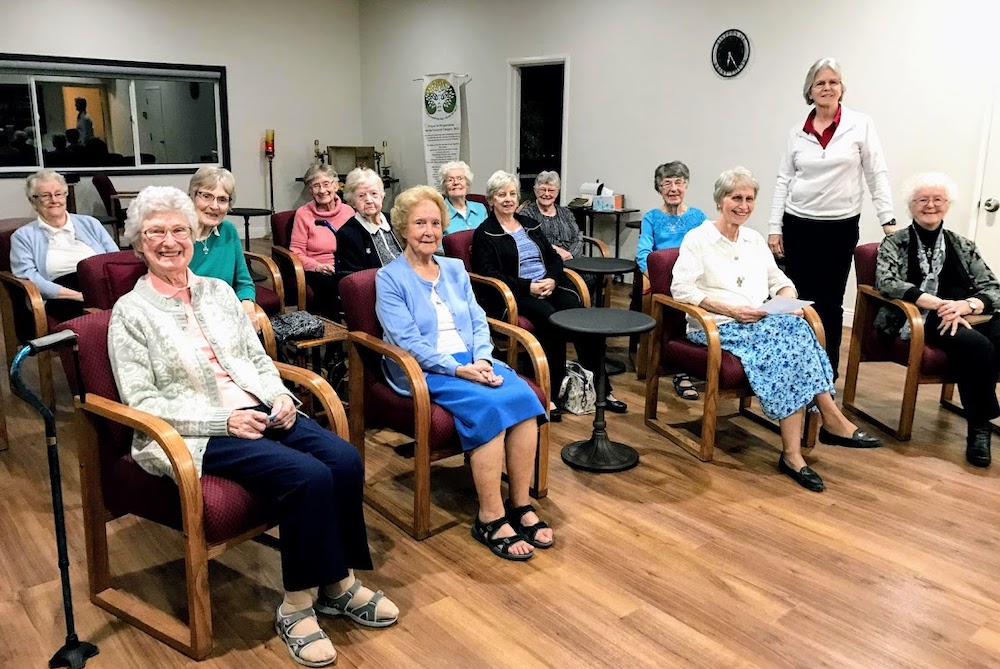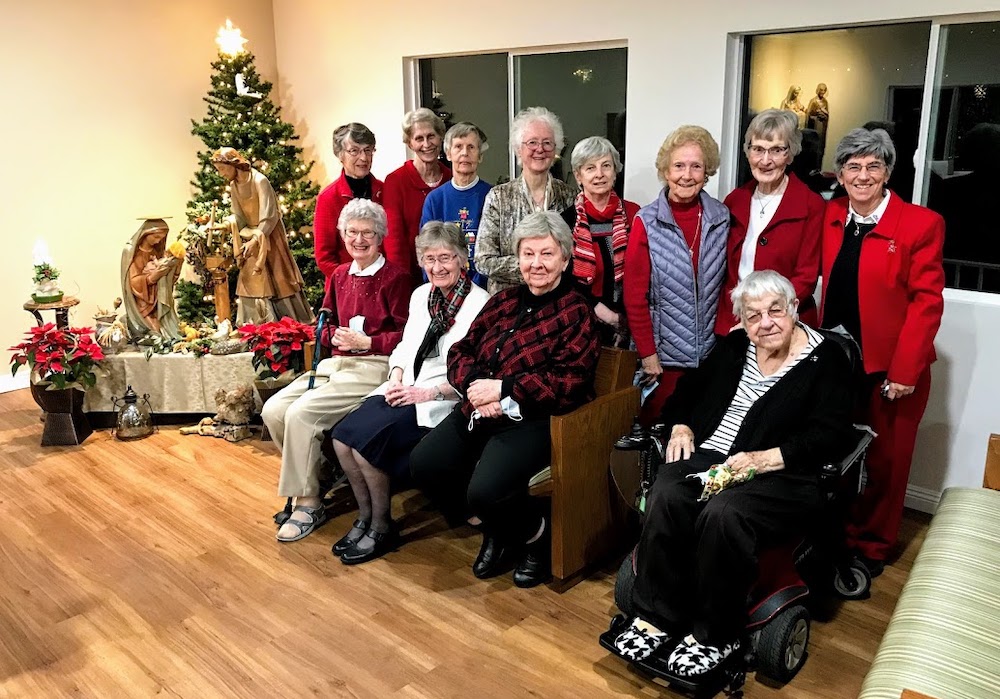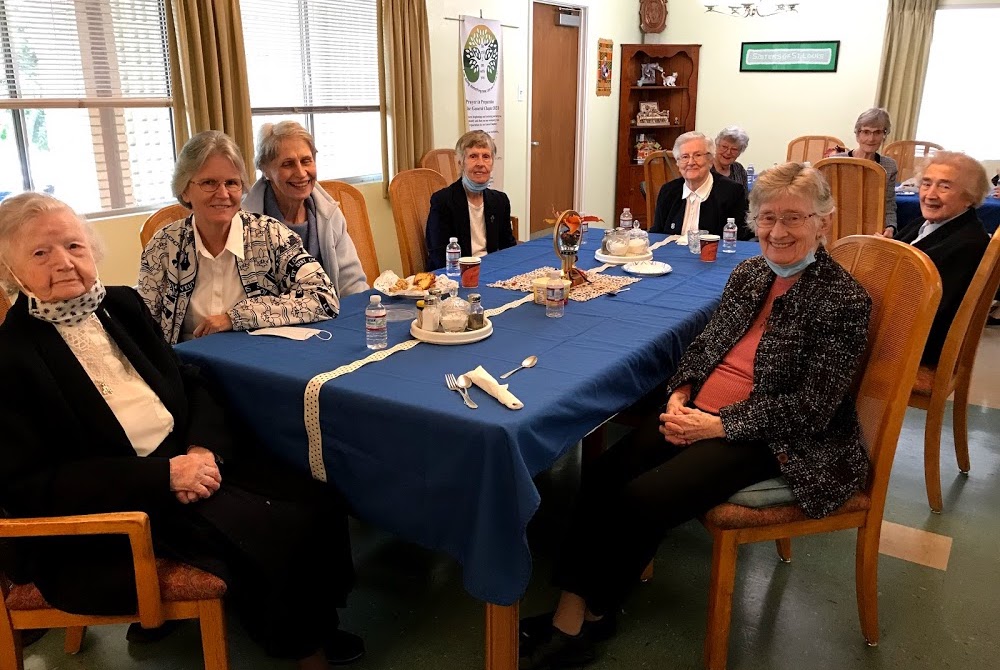
The Sisters of St. Louis attend a virtual meeting on Zoom in 2020 during the coronavirus pandemic. The spirit of "ut unum sint" (may they be one) guided our founder, Louis Marie Eugène Bautain. His passion for one world, healed, unified and transformed continues to inspire all we do today. We thus dedicate ourselves to bringing about unity and healing in a broken world. (Courtesy of the Sisters of St. Louis)
I recently learned about the African philosophy of ubuntu by watching a video of Anglican Archbishop Desmond Tutu, sent to me by a church leader from Brazil where I served as a missionary for 38 years. However, because it was presented in Portuguese, I needed to find English versions to share. I found two in English, one by Archbishop Tutu and another by Gertruide Matshe. Both were very engaging.
The basic messages describe ubuntu, an African philosophy that proclaims: "I am, because you are." Ubuntu is a word from a Zulu proverb: "Umuntu ngumuntu ngabantu," expressing the belief that a person is a person through others, meaning that we as humans share a common humanity.
Thus, the philosophy includes values of respect for human dignity, compassion, solidarity and consensus, and expectations of commitment and loyalty within and for the group. A deep sense of community is one of the important building blocks of Zulu society, according to Tutu in his book No Future Without Forgiveness. It actually is a pan-African building block.
The respect, compassion and solidarity of ubuntu are much needed in Brazil these days. Our Sisters of St. Louis living there have reported how Brazil is struggling with a fragile social system that often excludes the numerous poor and vulnerable. Resources to address COVID-19 have been limited and the situation has dramatically revealed the inequality and poverty of the country.
Advertisement
Politically too, national leadership has been weak. President Jair Bolsonaro has downplayed the situation, leaving it up to local officials to plan and cope on their own. Consequently, lockdowns have only been partially implemented as people, listening to their national leader, fail to take the situation seriously. The economy too is failing, which has been the president's focus, rather than the plight of the people's health. Commitment to justice is missing.
The ubuntu philosophy, besides calling for compassion and solidarity, also requires commitment to justice so that dignity for all is possible. Archbishop Tutu reminds us in his book: "If you are neutral in situations of injustice, you have chosen the side of the oppressor. If an elephant has its foot on the tail of a mouse, and you say that you are neutral, the mouse will not appreciate your neutrality."
Listening to the explanations of African ubuntu re-emphasized for me how much we can learn from others and how interconnected we truly are. As I watched the videos, I also realized that our St. Louis Sisters in Nigeria and Ghana might be very familiar with this philosophy.
Its message resonates throughout our African, Irish, English, Brazilian and USA Sisters of St. Louis communities. Our mission statement begins, "We, Sisters of St. Louis, faithful to our call 'That all may be one' (John 17:21) commit ourselves to live God's love for the whole of creation, and especially to stand in solidarity with those who have no choice — the poor and marginalized."
The spirit of ut unum sint (may they be one) guided our founder, Louis Marie Eugène Bautain. His passion for one world, healed, unified and transformed continues to inspire all we do today. We thus dedicate ourselves to bringing about unity and healing in a broken world. Many religious congregations, men and women, also share in this call, as do many organizations that pledge themselves to creating a better world.

The Sisters of St. Louis at their Woodland Hills, California, convent* gather as a community in the chapel for Christmas 2020. (Courtesy of the Sisters of St. Louis)
Day after day, we are reminded that our world is so in need of healing. COVID-19 has taken millions of lives, sickened millions of others and forced us to discover and live into a "new normal." However, being confined as most of us are gives us an opportunity to reflect on the meaning of life and the deepest values we hold. We often hear, "We are all in this together." Are we? Today we increasingly hear about health care workers, teachers, employees of factories, restaurants and beauty salons, and others joining forces, feeling for each other and proclaiming, "Your struggle is my struggle."
Recently I read a liturgical reflection on Creighton University's online ministries site for Jan. 28, 2021. The author Eileen Burke-Sullivan brilliantly wrote:
We may not have the gift of multi-tasking for the sake of the kingdom but perhaps we do have an unusual capacity for patience, or kindness, generosity, wisdom, insight — so many of the living gifts — the real expression of divine existence that is given to persons who desire them — bring their own expansion by practice. The Letter to the Hebrews that provides the first reading today challenges us to help one another find and exercise these gifts for one another. When that comes to pass then our mutual hope and our mutual love take us far beyond any isolated search for the good. What is truly gifting for any of us will be gifting for all of us, times infinity.
Eileen thus expanded on Hebrews 10:19-25 where it states: We must consider how to rouse one another to love and good works.
Throughout the world we have seen and heard many stories on the internet and television of people who are in fact discovering these deeply held values of our "oneness" with others and creation as well. The BBC, for example, spoke of ubuntu at the end of its famous podcast on January 1, 2021. It is amazing that this beautiful philosophy is and will be very relevant today and hopefully spreading into the future.
May this beautiful philosophy spread everywhere and give us hope that all will be well!

The Sisters of St. Louis in the convent dining room in Woodland Hills, California* (Courtesy of the Sisters of St. Louis)
*An earlier version of these photo captions gave an incorrect location.





